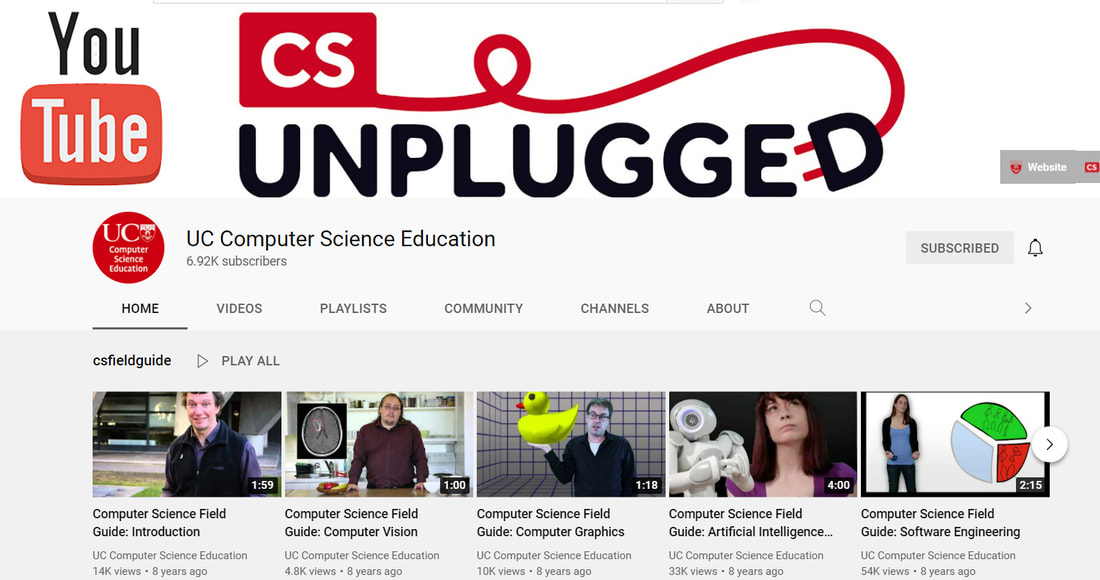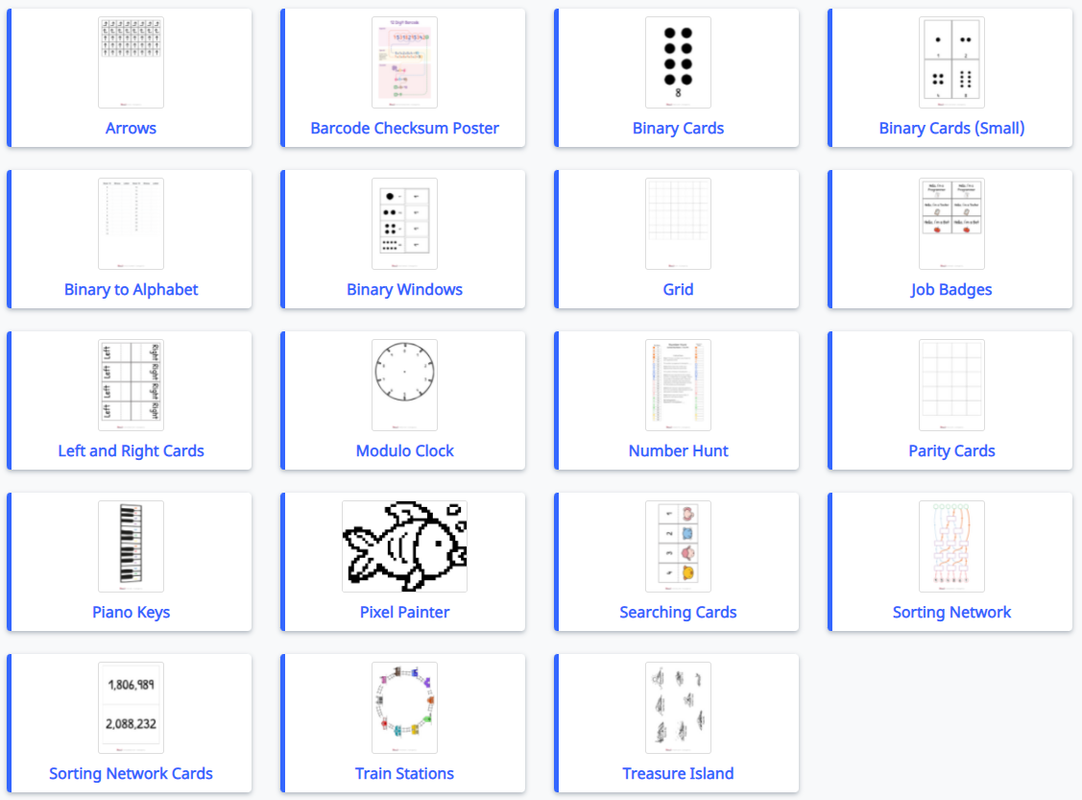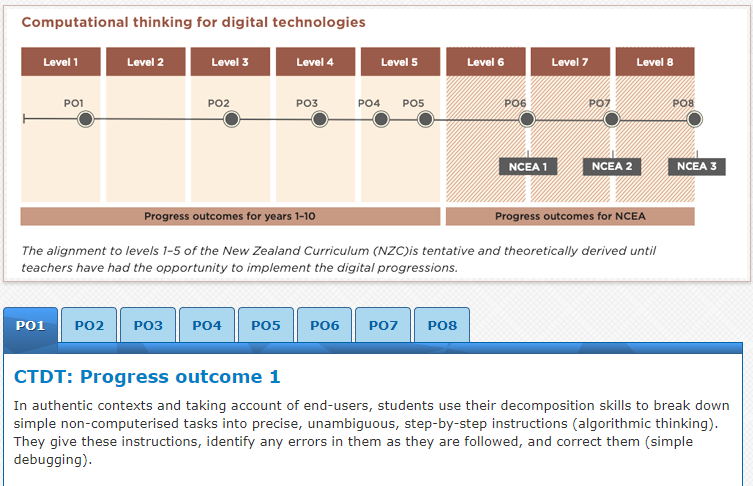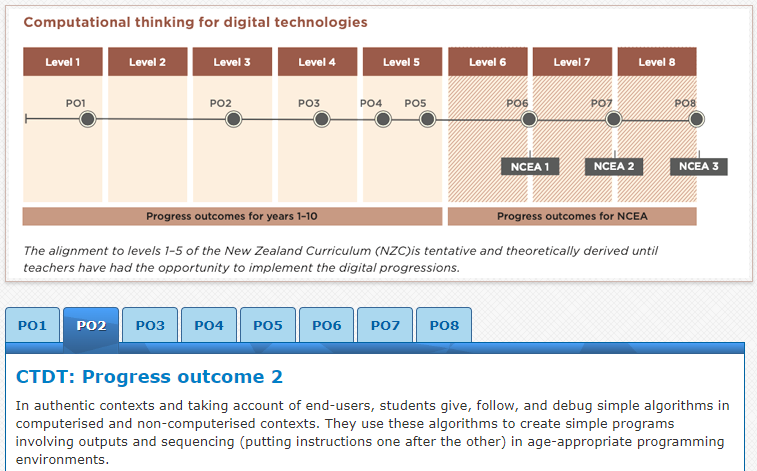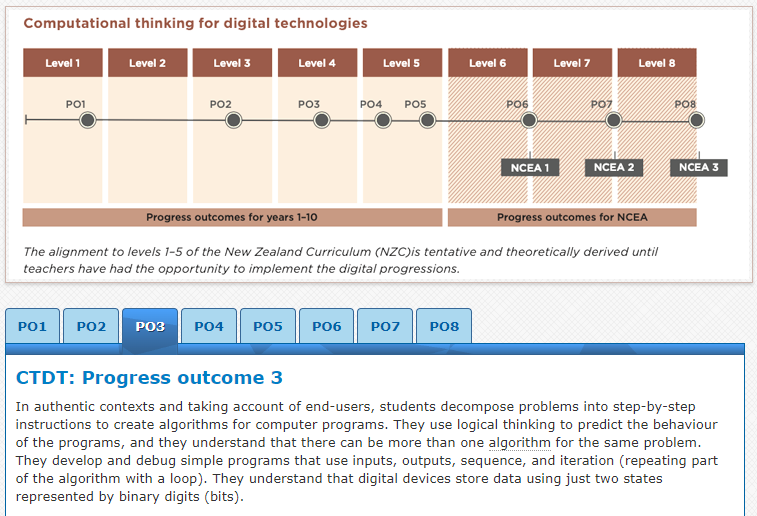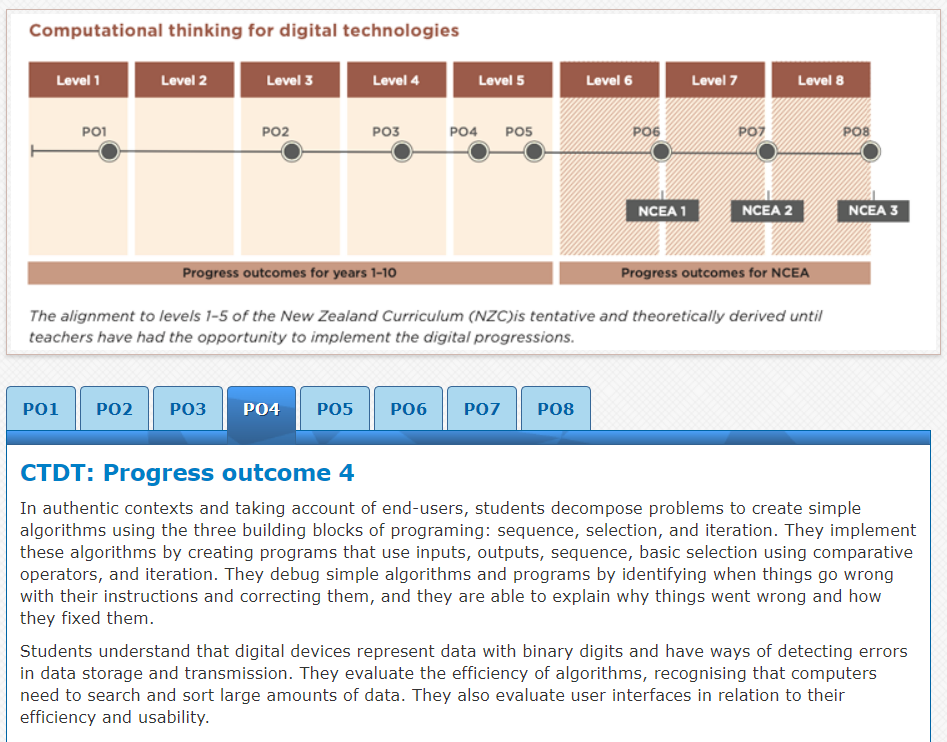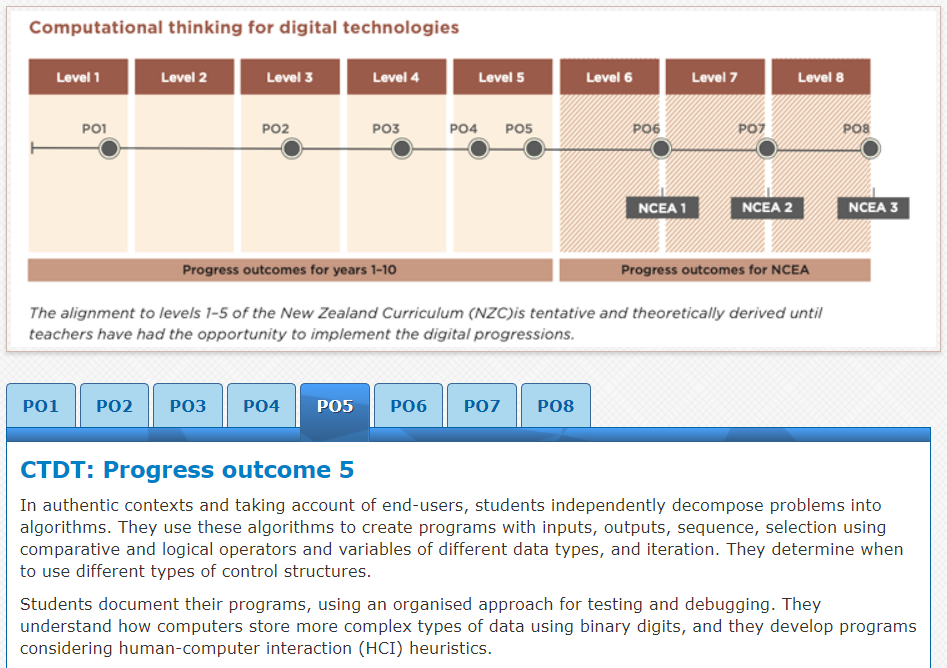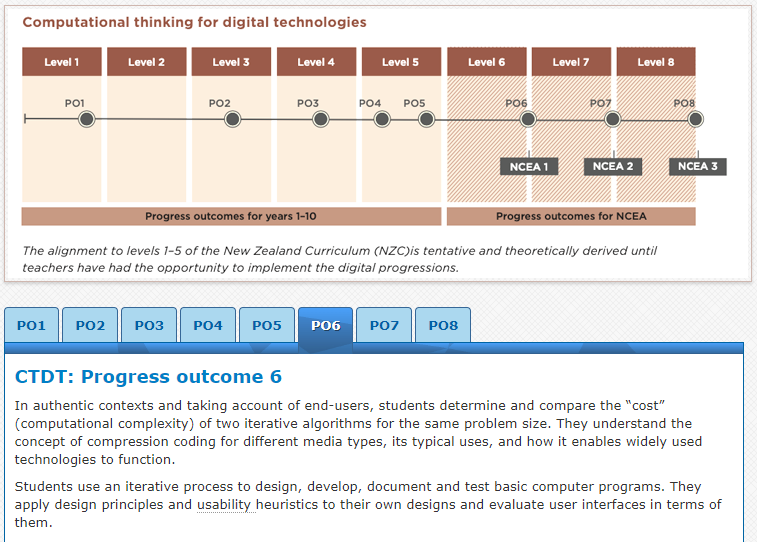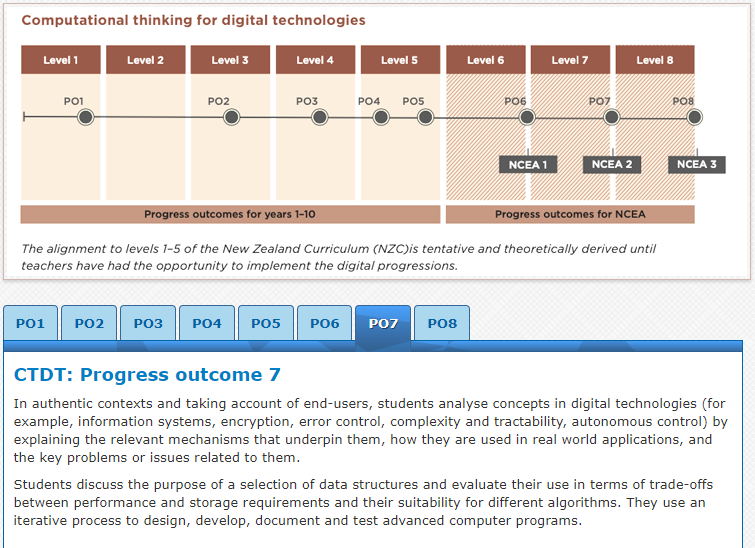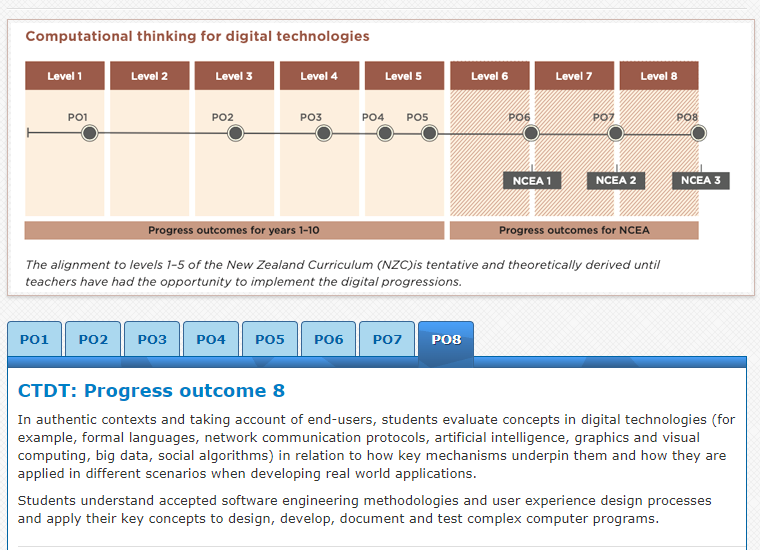This page features Computational Thinking information from the MoE and NZQA
In 2017 the Ministry of Education incorporated the Digital Technologies | Hangarau Matihiko strand into the
New Zealand Curriculum which included a new Computational Thinking pedagogy into the existing Digital Technologies curriculum of Computer Science and Programming (coding).
By 2020 all schools were mandated to incorporate Digital Technologies | Hangarau Matihiko and Computational Thinking into their curriculum for years 1 to 13, a shift from the existing Digital Technology curriculum being optional for years 11 to 13.
Computational thinking enables a student to express problems, and formulate solutions in a way that means a computer (an information processing agent) can be used to solve them. MoE
New Zealand Curriculum which included a new Computational Thinking pedagogy into the existing Digital Technologies curriculum of Computer Science and Programming (coding).
By 2020 all schools were mandated to incorporate Digital Technologies | Hangarau Matihiko and Computational Thinking into their curriculum for years 1 to 13, a shift from the existing Digital Technology curriculum being optional for years 11 to 13.
Computational thinking enables a student to express problems, and formulate solutions in a way that means a computer (an information processing agent) can be used to solve them. MoE
Teaching Computational Thinking through CS Unplugged activities teaches students how to:
- describe a problem,
- identify the important details needed to solve this problem,
- break the problem down into small, logical steps,
- use these steps to create a process (algorithm) that solves the problem,
- and then evaluate this process.
Computational thinking skills:
- Algorithmic thinking
- Abstraction
- Decomposition
- Generalising and patterns
- Evaluation
- Logic
CS Unplugged on YouTube youtube.com/ComputerScienceEducation
CS Unplugged printable Computational Thinking lessons csunplugged.org/resources
Technology is intervention by design. Digital Technologies focuses on building ākonga capability to apply technological ideas within a digital environment. Digital Technologies is a broad subject that covers many domains, for example: software programming, electronic environments and embedded systems, digital information systems, digital media.
As they study, ākonga will develop computational thinking skills and the ability to design and develop digital outcomes. They will also learn how computers represent and process data - the fundamental material of the subject. Ākonga will develop an understanding of how data can be organised and the ethical issues surrounding its use. They will learn about the digital design and development processes used to create, test, and evaluate digital outcomes. Ākonga will practise manaakitanga as they learn to prioritise users in the outcomes they develop, and understand how Digital Technologies outcomes impact on the people who use them.
Finally, ākonga will learn fundamental principles and concepts that existing and emerging technologies are built on. This knowledge will allow them to quickly adapt to the challenges and opportunities offered by new technologies. They will become informed users and innovative creators of technology.
Finally, ākonga will learn fundamental principles and concepts that existing and emerging technologies are built on. This knowledge will allow them to quickly adapt to the challenges and opportunities offered by new technologies. They will become informed users and innovative creators of technology.
There are four Big Ideas in Digital Technologies. The nature of this subject as a discipline means aspects of Significant Learning often cross over multiple Big Ideas, and vice versa.
1 - The discipline of Digital Technologies embodies whanaungatanga.
Outcomes are made by people, for people, within cultural, social, and environmental contexts.
Outcomes are made by people, for people, within cultural, social, and environmental contexts.
2 - Digital outcomes are created for a purpose by following established processes
3 - The discipline of Digital Technologies embodies auahatanga.
Outcomes solve problems and enhance and expand human possibilities.
Outcomes solve problems and enhance and expand human possibilities.
4 - All digital technologies are underpinned by algorithms and computer science principles
Computational Thinking progress outcomes years 1 > 13
Years 1>10 - Progress outcome Level 1
Years 1>10 - Progress outcome Level 2
Years 1>10 - Progress outcome Level 3
Years 1>10 - Progress outcome Level 4
Years 1>10 - Progress outcome Level 5
Year 11 - Progress outcome Level 6
Year 12 - Progress outcome Level 7
Year 13 - Progress outcome Level 8
New Zealand Ministry of Education development paper 2016
Revising the technology learning area to strengthen digital technologies in the New Zealand Curriculum
Revising the technology learning area to strengthen digital technologies in the New Zealand Curriculum
| moe_computational_thinking_development_paper.pdf | |
| File Size: | 1878 kb |
| File Type: | |
digital.school.nz by Marc Williams ©2023 email
